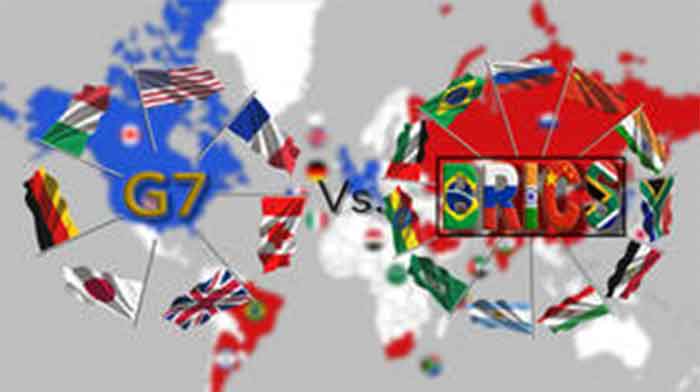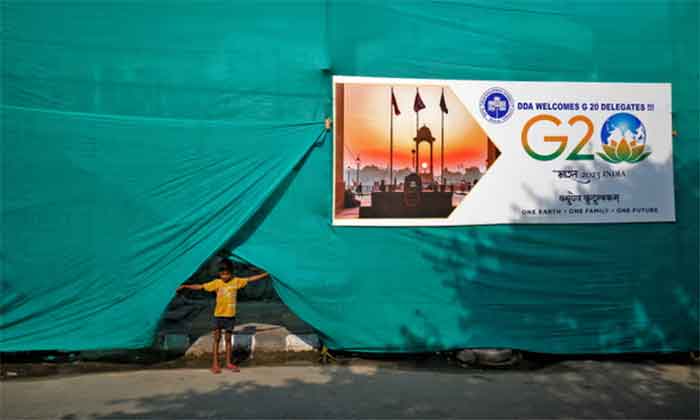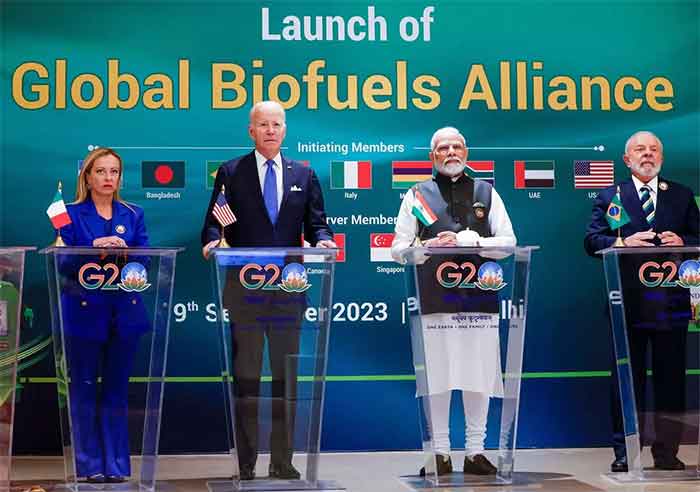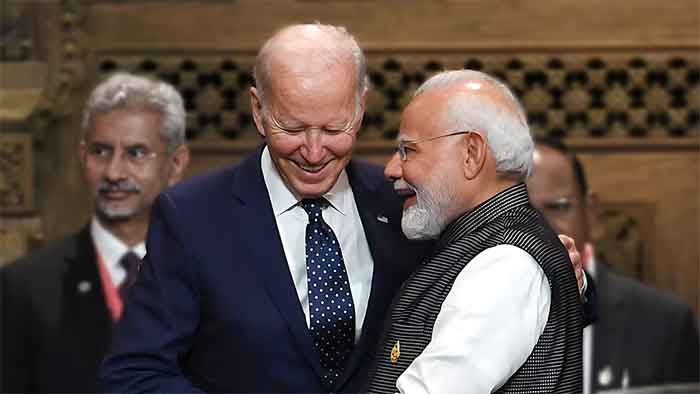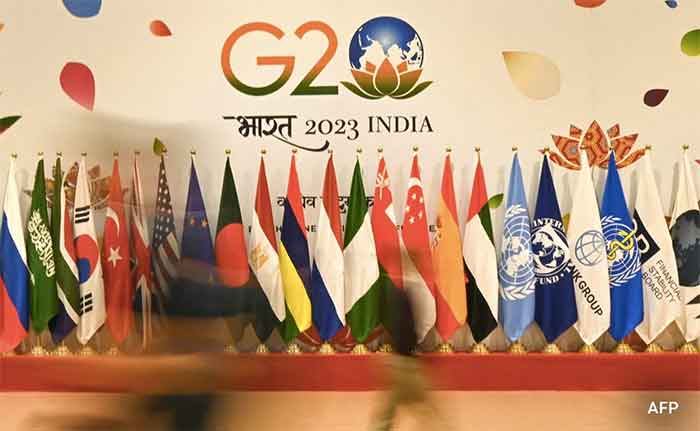
There was undoubtedly a display of a friendly lexicon at the 18th G20 summit in New Delhi-India on September 9–10, 2023, including phrases like, We are One Earth, One Family, and we share One Future and We, the Leaders of the G20 under the theme ‘Vasudhaiva Kutumbakam.’ The 18th G20 summit, the intergovernmental forum for global economic cooperation of the world’s major economies, took place when political and economic tensions were rising, and the developed and developing nations of the world were forging new global alliances. The themes selected by the Indian presidency and the G20 leaders’ choice to grant the African Union (AU) permanent membership status both highlight the increased significance that the G20 members place on the nations of the “Global South.” It is the case to demonstrate the underlying geo-political tensions and muscles on the global scale and, to a significant extent, the seeming global economic architecture. Leaders have been seeking to establish the link between the Global South and the Global North within the framework of the current changes. The G20 leaders will also try to demonstrate their commitment to emerging countries stumbling along the growth path. The world is facing these difficulties, but the fundamental issue surrounding the general welfare of most people continues to be very contentious.
Delhi Declaration
After the G20 summit in New Delhi, where Charles Michel, the president of the European Council, and Ursula von der Leyen, the president of the European Commission, represented the EU, the G20 leaders published a statement that all G20 participants endorsed. The leaders adopted a comprehensive 83-paragraph declaration with the theme “One Earth, One Family, One Future” in response to the six G20 priorities of the Indian presidency (green development, inclusive growth, progress on the UN SDGs, technological transformation, multilateral institutions for the 21st century, and women-led development). The declaration also addressed requests made by the EU, such as those for a multilateral development bank reform and steps to combat climate change, such as tripling renewable energy capacity by 2030. A few of the deliverables included:
- To speed the 2030 Agenda for Sustainable Development’s complete and efficient implementation;
- To enact a plan to treble renewable energy production worldwide by 2030;
- To pursue avenues for development that are environmentally sustainable, climate-resilient, and low in GHGs and carbon emissions;
- To accelerate efforts to fulfil the Paris Agreement, including its temperature goal, and scale up funding from all sources;
- To access digital services and public infrastructure with chances for digital transformation advantage to promote equitable and sustainable growth;
- To close the gender pay gap and encourage the whole, equal, worthwhile, and effective participation of women in the economic decision-making process;
- To demand that the multilateral system be reformed, together with the international development financing system, to make multilateral development banks (MDBs) more efficient;
- To commit to a multilateral trade system founded on rules, free from discrimination, open to all, equitable, sustainable, and transparent, with the World Trade Organisation at its centre.
Geo-Political Questions
The absence of China’s President Xi Jinping, the head of the world’s second-largest economy, generated much media attention. It was speculated whether Xi, who Li Qiang, China’s Premier, represented, skipped the event because of strained relations between China and India or the complicated domestic situation. Other commentators concluded that China prefers to create a new global system of governance and is disillusioned with the G20 because it is overly dominated by US influence. In the months leading up to the summit, it appeared doubtful that the G20 leaders would be able to agree on a final communiqué due to disagreements within the group, particularly about Russia’s conflict with Ukraine.
But in the end, the G20 Sherpas were able to generate a text that all of the presidents could agree on after 200 hours of talks and 300 bilateral encounters. However, the G20 New Delhi Leaders’ Declaration is weaker than the leaders’ statement from the previous year. This year’s text does not directly criticise Russia but urges all nations to “refrain from action against the territorial integrity and sovereignty or political independence of any state.” The 2022 declaration still included a reference in which members (according to their national positions) deplored in the strongest terms the aggression by the Russian Federation against Ukraine. They also demanded the execution of programmes like the Black Sea Grain Initiative to guarantee prompt and unhindered grain delivery.
Vladimir Putin, the president of Russia, was represented at the summit by Sergey Lavrov, the foreign minister, as he had done the year before. The latter hailed the summit as a success and claimed that it was possible “to prevent the success of the West’s attempt to again “Ukrain-ize” the entire agenda to the detriment of discussing the urgent problems of developing countries” due to the “consolidated position of the Global South in defence of its legitimate interests.” Ukraine expressed its displeasure with the G20’s final statement but thanked its allies for helping to promote Ukraine’s cause. Volodymyr Zelenskyy, president of Ukraine, who participated in the summit in 2022 through video conference, was not invited to the gathering this time. Major emerging economies of the Global South (South Africa, India, Brazil, and Indonesia), who resist taking sides in a world that is becoming more polarised, reportedly played a critical role in reaching a compromise that allowed all G20 members to sign the final declaration. The G20 leaders’ choice to give the African Union, representing 55 African member states, permanent membership status recognises the expanding significance of the emerging nations from the Global South.
Horizontal Affairs: Conglomerate for Global Infra-Investment
On the fringes of the summit, several side events happened. During the G20 summit in Bali last year, the EU, the US, and Indonesia launched the Partnership for Global Infrastructure and Investment (PGII), which US President Joe Biden and Indian Prime Minister Narendra Modi co-hosted. PGII aims to scale up investments for high-quality infrastructure projects and the creation of economic corridors. The US, the United Arab Emirates, Saudi Arabia and India, France, Germany, Italy, and the European Union signed a memorandum of understanding on the India-Middle East-Europe Economic Corridor (IMEC), which is considered a potential rival to China’s Belt and Road Initiative. To boost commerce and economic growth, the proposed corridor would connect India, Saudi Arabia, the United Arab Emirates, Jordan, Israel, and the EU. Additionally, the EU and the US decided to work together to promote the Trans-African Corridor, which runs through the Port of Lobito in Angola and connects the Northwestern part of Zambia and the Southern Democratic Republic of the Congo to regional and international trade markets.
Feedback and Potential Strides
For the Indian presidency and Modi, the fact that the G20 leaders agreed on a final declaration has been seen as a victory. Additionally, several scholars emphasise that India effectively represented the Global South during its G20 presidency, particularly by selecting issues that affected poor nations and seeking to make the AU a permanent member of the G20. Analysts give the G20 conference a very unfavourable review regarding climate change promises. While some have praised the G20’s commitment to double renewable energy and given the Indian presidency credit for choosing sustainable topics, most civil society comments have been critical of the final declaration. The outcome was unsatisfactory for Greenpeace, for instance, not least because leaders could not agree on the phase-out of fossil fuels. From October 12-14, 2023, the new Parliament building in New Delhi will serve as the host country for the speakers of the G20 nations’ parliaments, including the European Parliament. Members of the BRICS organisation will also hold the successive two G20 presidencies: Brazil will officially assume the yearly G20 leadership on December 1, and South Africa will take it over a year later. Brazil’s G20 presidency will focus on three areas: i) social inclusion and the fight against hunger; ii) energy transition and sustainable development in its three facets (social, economic, and environmental); and iii) reform of international governance institutions. This announcement was made after the G20 summit.
Dr. Nafees Ahmad is an Associate Professor at the Faculty of Legal Studies, South Asian University (SAU)-New Delhi. He holds a doctorate in International Refugee Law and Human Rights. His scholarship focuses on RAMS (Refugees, Asylum-seekers, Migrants, Stateless) and the role of Artificial Intelligence (AI) in their protection, Global Forced Displacement, Global Circumstantial Migration (GCM) Governance and Climate Refugees in South Asia. He also addresses International Politics of Asylum, Refugee Policy Paradigms, Invisible Frames of Asylum, Disconnects of Durable Solutions and SAARC connects and contexts of refugee protection. He has conceived and introduced a new SAARC-specific Program in 2011 called Comparative Constitutional Law of SAARC Nations (CCLSAARCN) at LLM level. He publishes inter-alia in the Groningen Journal of International Law (The Netherlands), Harvard International Law Journal, Asia-Pacific Journal of Human Rights and Law (Brill), International Journal of Environment and Waste Management (Geneva) indexed in SCOPUS, International Journal on Minority and Group Rights (Brill), Kings’ Student Law Review (King’s College London), ISIL Year Book on International Humanitarian Law and Refugee Law, and ELCOP Year Book of Human Rights- Dhaka and NUJS International Journal of Legal Studies and Research (IJLSR) etc. Dr. Ahmad has co- authored a book on Climate Refugees in South Asia (2019) Springer. His book on International Refugee Law and Human Rights is in press. Dr. Ahmad is also an active blogger, writer, poet and Op-Ed contributor to many international digital platforms in the fields of Refugee Research, Forced Population Transfer, IRL, IHRL, IHL, International Relations and Diplomacy etc. Dr. Ahmad has been a Resource Person and External Reviewer for the Ministry of Law; Government of India sponsored Research Project on Judicial Reforms since June 2016 at the Indian Institute of Management (IIM-Kashipur). Further, he has been a visiting professor at Indian Society of International Law (ISIL), Jamia Milia Islamia-New Delhi and Judicial Academies of various states of India. Dr. Ahmad has also been delivering lectures to the Armed Forces’ sensitization programmes on IHRL, IHL and ICL. He serves on many committees and editorial boards of many international journals and magazines. Dr. Ahmad has been serving since 2010 as Senior Visiting Faculty to national and international research institutions. He is available #24X7 at: [email protected]

